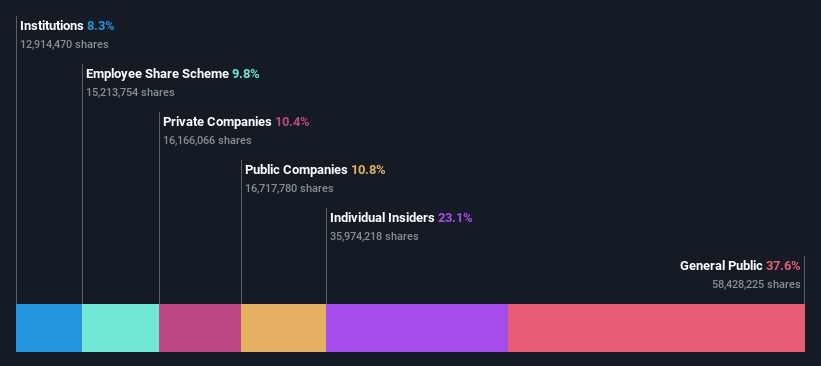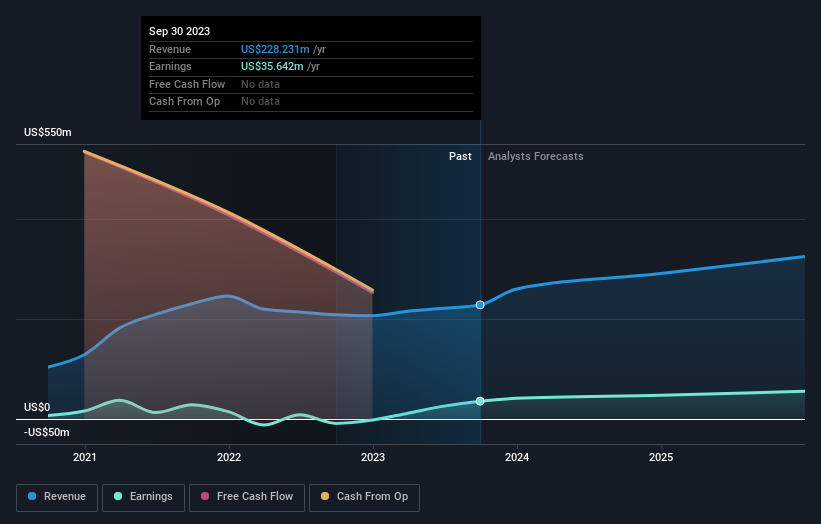Retail investors who hold 38% of UP Fintech Holding Limited (NASDAQ:TIGR) gained 8.9%, insiders profited as well
Key Insights
UP Fintech Holding's significant retail investors ownership suggests that the key decisions are influenced by shareholders from the larger public
A total of 7 investors have a majority stake in the company with 51% ownership
If you want to know who really controls UP Fintech Holding Limited (NASDAQ:TIGR), then you'll have to look at the makeup of its share registry. We can see that retail investors own the lion's share in the company with 38% ownership. Put another way, the group faces the maximum upside potential (or downside risk).
While retail investors were the group that reaped the most benefits after last week’s 8.9% price gain, insiders also received a 23% cut.
Let's take a closer look to see what the different types of shareholders can tell us about UP Fintech Holding.
Check out our latest analysis for UP Fintech Holding
What Does The Institutional Ownership Tell Us About UP Fintech Holding?
Institutions typically measure themselves against a benchmark when reporting to their own investors, so they often become more enthusiastic about a stock once it's included in a major index. We would expect most companies to have some institutions on the register, especially if they are growing.
UP Fintech Holding already has institutions on the share registry. Indeed, they own a respectable stake in the company. This can indicate that the company has a certain degree of credibility in the investment community. However, it is best to be wary of relying on the supposed validation that comes with institutional investors. They too, get it wrong sometimes. If multiple institutions change their view on a stock at the same time, you could see the share price drop fast. It's therefore worth looking at UP Fintech Holding's earnings history below. Of course, the future is what really matters.
We note that hedge funds don't have a meaningful investment in UP Fintech Holding. Looking at our data, we can see that the largest shareholder is the CEO Tianhua Wu with 14% of shares outstanding. Xiaomi Corporation is the second largest shareholder owning 11% of common stock, and Binsen Tang holds about 7.8% of the company stock.
We did some more digging and found that 7 of the top shareholders account for roughly 51% of the register, implying that along with larger shareholders, there are a few smaller shareholders, thereby balancing out each others interests somewhat.
While it makes sense to study institutional ownership data for a company, it also makes sense to study analyst sentiments to know which way the wind is blowing. Quite a few analysts cover the stock, so you could look into forecast growth quite easily.
Insider Ownership Of UP Fintech Holding
The definition of company insiders can be subjective and does vary between jurisdictions. Our data reflects individual insiders, capturing board members at the very least. Management ultimately answers to the board. However, it is not uncommon for managers to be executive board members, especially if they are a founder or the CEO.
I generally consider insider ownership to be a good thing. However, on some occasions it makes it more difficult for other shareholders to hold the board accountable for decisions.
Our information suggests that insiders maintain a significant holding in UP Fintech Holding Limited. It has a market capitalization of just US$687m, and insiders have US$159m worth of shares in their own names. We would say this shows alignment with shareholders, but it is worth noting that the company is still quite small; some insiders may have founded the business. You can click here to see if those insiders have been buying or selling.
General Public Ownership
With a 38% ownership, the general public, mostly comprising of individual investors, have some degree of sway over UP Fintech Holding. This size of ownership, while considerable, may not be enough to change company policy if the decision is not in sync with other large shareholders.
Private Company Ownership
It seems that Private Companies own 10%, of the UP Fintech Holding stock. Private companies may be related parties. Sometimes insiders have an interest in a public company through a holding in a private company, rather than in their own capacity as an individual. While it's hard to draw any broad stroke conclusions, it is worth noting as an area for further research.
Public Company Ownership
We can see that public companies hold 11% of the UP Fintech Holding shares on issue. We can't be certain but it is quite possible this is a strategic stake. The businesses may be similar, or work together.
Next Steps:
I find it very interesting to look at who exactly owns a company. But to truly gain insight, we need to consider other information, too.
I like to dive deeper into how a company has performed in the past. You can access this interactive graph of past earnings, revenue and cash flow, for free.
Ultimately the future is most important. You can access this free report on analyst forecasts for the company.
NB: Figures in this article are calculated using data from the last twelve months, which refer to the 12-month period ending on the last date of the month the financial statement is dated. This may not be consistent with full year annual report figures.
Have feedback on this article? Concerned about the content? Get in touch with us directly. Alternatively, email editorial-team (at) simplywallst.com.
This article by Simply Wall St is general in nature. We provide commentary based on historical data and analyst forecasts only using an unbiased methodology and our articles are not intended to be financial advice. It does not constitute a recommendation to buy or sell any stock, and does not take account of your objectives, or your financial situation. We aim to bring you long-term focused analysis driven by fundamental data. Note that our analysis may not factor in the latest price-sensitive company announcements or qualitative material. Simply Wall St has no position in any stocks mentioned.

 Yahoo Finance
Yahoo Finance 

